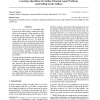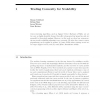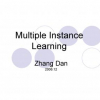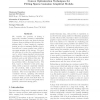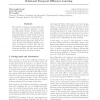ICML
2006
IEEE
14 years 5 months ago
2006
IEEE
In a principal-agent problem, a principal seeks to motivate an agent to take a certain action beneficial to the principal, while spending as little as possible on the reward. This...
ICML
2006
IEEE
14 years 5 months ago
2006
IEEE
ICML
2006
IEEE
14 years 5 months ago
2006
IEEE
ICML
2006
IEEE
14 years 5 months ago
2006
IEEE
In many applications, unlabelled examples are inexpensive and easy to obtain. Semisupervised approaches try to utilise such examples to reduce the predictive error. In this paper,...
ICML
2006
IEEE
14 years 5 months ago
2006
IEEE
ICML
2006
IEEE
14 years 5 months ago
2006
IEEE
We consider the problem of fitting a large-scale covariance matrix to multivariate Gaussian data in such a way that the inverse is sparse, thus providing model selection. Beginnin...
ICML
2006
IEEE
14 years 5 months ago
2006
IEEE
We show that several important Bayesian bounds studied in machine learning, both in the batch as well as the online setting, arise by an application of a simple compression lemma....
ICML
2006
IEEE
14 years 5 months ago
2006
IEEE
We consider the problem of clustering in its most basic form where only a local metric on the data space is given. No parametric statistical model is assumed, and the number of cl...
ICML
2006
IEEE
14 years 5 months ago
2006
IEEE
A family of probabilistic time series models is developed to analyze the time evolution of topics in large document collections. The approach is to use state space models on the n...
ICML
2006
IEEE
14 years 5 months ago
2006
IEEE
We introduce relational temporal difference learning as an effective approach to solving multi-agent Markov decision problems with large state spaces. Our algorithm uses temporal ...
